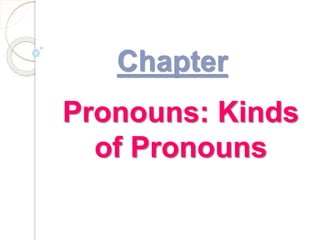
Pronouns: Kinds of Pronouns
- 2. Introduction Meaning of Pronoun: • A word that is used in the place of a noun. • It is used to avoid the monotony of repetition. • It has the same position as a noun in a sentence. • Like a Noun, a Pronoun is also an object of a sentence. • Like Noun, Pronoun should also agree with verb in a sentence. Examples of Pronoun are:
- 3. Kinds of Pronouns 1. Personal Pronoun - I, we. You, he, she, it, they, me, us, you, his, her, it, them 2. Reflexive Pronoun Myself, yourself, and himself, herself, itself, Emphatic Pronoun yourselves, ourselves, themselves 3. Demonstrative Pronoun - This, that, these, those, such 4. Indefinite Pronoun - Some, one, none, few, all, many, others
- 4. 5. Distributive Pronoun - Each, either, neither 6. Interrogative Pronoun - What, who, which, whose, whom 7. Relative Pronoun - Who, whose, whom, that, which
- 6. 1. Personal Pronoun They are of three kinds and refer to persons. 1. First Person - refers to the person or persons speaking. 2. Second Person - refers to the person or persons listening. 3. Third Person - refers to the person or persons spoken about.
- 7. Personal Pronoun Subjective Objective Possessive
- 8. mine yours his hers its our yours theirs Possessive Pronoun & Possessive Adjective • This book is mine. (Possess. Pronoun) • This is my book. (Possess. Adjective) • Is this yours? (Possess. Pronoun) • Is this your umbrella? (Possess. Adjective) my your his her its our your their
- 9. 2. Reflexive Pronoun They are the receivers of the action and behave like objects of the verb but they refer to the same person as subject.
- 10. Emphatic Pronoun They are same as reflexive pronoun and are used for emphasis. They are used with a Noun or Pronoun for the sake of emphasis. Examples- You will hurt yourself. Reflexive I blame myself for it. Pronoun The boys hid themselves. He himself told me. Emphatic You yourself are to blame for this . Pronoun The Queen herself came to see the clown.
- 11. 3. Demonstrative Pronoun They are used to point out the object or objects for which they are used. Examples are- This, these, that, those, such.
- 12. Difference between Demonstrative Pronoun and Demonstrative Adjective This is my pencil. (Dem. Pronoun) This pencil is mine. (Dem. Adjective) That is my book. (Dem. Pronoun) That book is mine. (Dem. Adjective) These are your pens. (Dem. Pronoun) These pens are yours.(Dem. Adjective) Those are her dogs. (Dem. Pronoun) Those dogs are hers. (Dem. Adjective)
- 13. 4. Indefinite Pronouns They refer to persons or things in general way. They do not refer to any particular person or thing. Examples: Some, all, many, few, one, none, others etc. Somebody is All the children Both are driving the car. are playing. baking a cake.
- 14. Some more examples of Indefinite Pronoun
- 15. 5. Distributive Pronouns They refer to a number of persons or things, one at time. Examples- Each, neither, either etc Either of these books will do. Few students will be awarded for their achievements.
- 16. 6. Interrogative Pronouns They are used for asking questions. Examples- What , who, which, whose, whom etc.
- 17. Interrogative Pronouns What is your phone number? Who bought this car? Whom did you call? Why are you laughing?
- 18. Difference between Interrogative Pronoun and Interrogative Adjective Which way shall we take? (Int. Adj.) Which is your pen? (Int. Pronoun) What books has he selected? (Int. Adj.) What shall we do now? (Int. Pronoun) Which dress would look good on me? (Int. Adj.) What should I wear? (Int. Pronoun) What food would you like to eat? (Int. Adj.) What do you want to eat? (Int. Pronoun)
- 19. 7. Relative Pronouns The pronouns who, whom, whose, which and that which joins two sentences and refer back to its nouns going before them, are called Relative Pronouns. The Noun to which a Relative Pronoun refers or relates is called Antecedent.
- 21. Examples- 1. This is the man. He stole my purse. This is the man who stole my purse. 2. This is the boy. His nature is good. This is the boy whose nature is good. 3. This is the boy. The teacher praised him. This is the boy whom the teacher praised. The antecedent in sentence 1 is ‘man’ and in sentences 2 and 3 is ‘boy’.
- 22. 4. This is the house. Jack built it. This is the house that Jack built. 5. This is the horse. It won the race. This is the horse which won the race. The antecedent in sentence 4 is ‘house’ and in sentence 5 is ‘horse’. • If relative pronoun is a subject we use who. Example- Anyone who does the good work will be rewarded. •If relative pronoun is an object we use whom. Example- These are the boys whom others do not like.
- 23. Presented by: Ms. Swati Hasija
